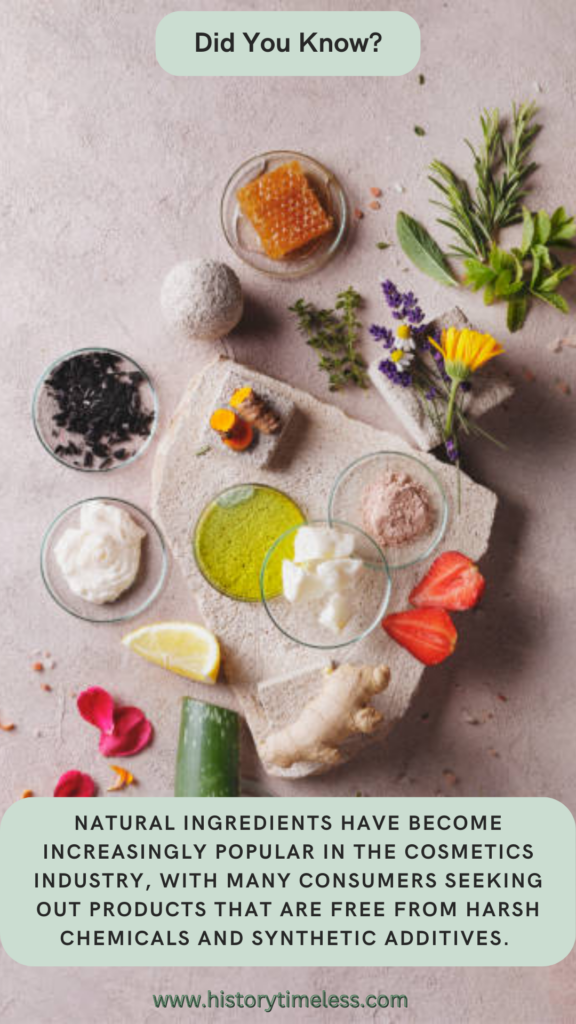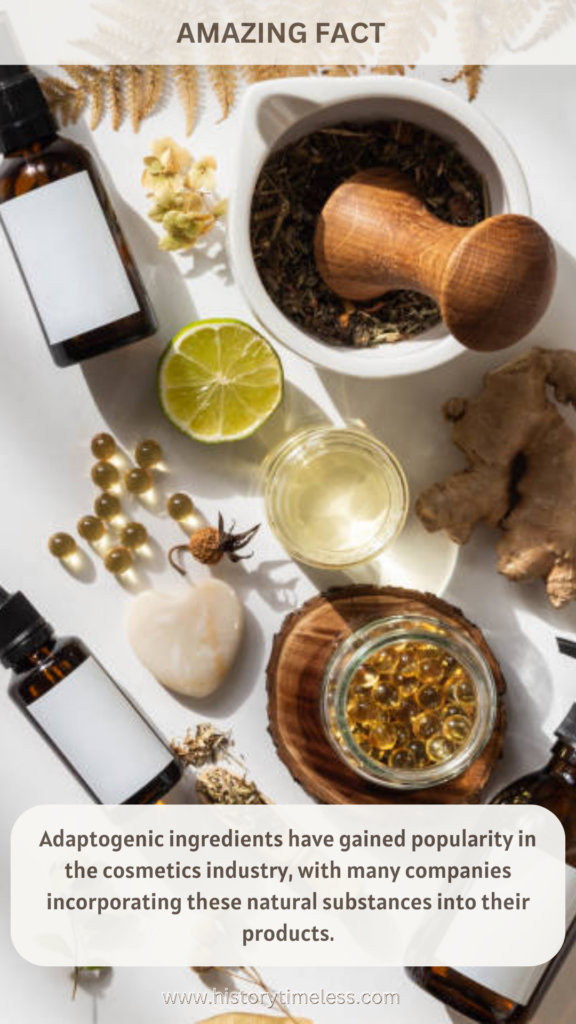Get ready to discover the ultimate secrets to achieving flawless skin, vibrant hair, and a radiant glow. From surprising ingredients to revolutionary techniques, these cosmetic truths will take your beauty routine to the next level. Whether you’re a seasoned beauty enthusiast or just starting out, these facts will leave you feeling informed and inspired. With a mix of scientific insights and expert tips, you’ll be on your way to unlocking your full beauty potential.
1. The Ancient Origins of Makeup
The use of cosmetics dates back to ancient civilizations, with evidence of makeup found in ancient Egypt, Greece, and Rome. These early cosmetics were made from natural ingredients such as berries, beeswax, and olive oil.
The Egyptians, in particular, were known for their elaborate makeup routines, using malachite for eye shadow and kohl for eyeliner. This early use of cosmetics laid the foundation for the modern industry.
2. The Science Behind Skincare
Skincare is a complex process that involves understanding the skin’s natural barrier function and how to maintain its health. The skin’s pH level, moisture levels, and skin type all play a crucial role in determining the best skincare routine.
Cosmetic companies use scientific research to develop products that cater to different skin types and concerns. By understanding the science behind skincare, consumers can make informed decisions about their skincare routines.
3. The Impact of Social Media on Cosmetic Trends
Social media has revolutionized the way we discover and engage with cosmetic trends. Influencers and beauty bloggers have become key players in shaping the industry, with millions of followers hanging on to their every word.
The rise of social media has also led to the democratization of beauty, with more diverse voices and perspectives being represented. This shift has forced cosmetic companies to adapt and respond to changing consumer demands.
4. The Art of Fragrance Creation
Fragrance creation is a complex and nuanced process that involves blending essential oils, aroma compounds, and other ingredients to create unique scents. Perfumers use their sense of smell and expertise to craft fragrances that evoke emotions and convey messages.
The art of fragrance creation requires a deep understanding of the psychological and emotional impact of scents on human behavior. Perfumers must balance different notes and accords to create a harmonious and lasting fragrance.
5. The Benefits of Natural Ingredients
Natural ingredients have become increasingly popular in the cosmetics industry, with many consumers seeking out products that are free from harsh chemicals and synthetic additives.

Natural ingredients such as plant extracts, essential oils, and herbs offer a range of benefits, from soothing and calming the skin to providing antioxidant protection. By using natural ingredients, cosmetic companies can create products that are not only effective but also sustainable and eco-friendly.
6. The Importance of Cosmetic Regulation
Cosmetic regulation is crucial to ensuring the safety and efficacy of cosmetic products. Regulatory bodies such as the FDA and EU Cosmetics Regulation set guidelines and standards for the industry, covering everything from ingredient safety to labeling and packaging.
Cosmetic companies must comply with these regulations to ensure that their products meet the required standards. This helps to protect consumers from harmful ingredients and misleading claims.
7. The Rise of Sustainable Cosmetics
The cosmetics industry has come under scrutiny for its environmental impact, from packaging waste to water pollution. In response, many companies are adopting sustainable practices, such as using eco-friendly packaging, sourcing natural ingredients, and reducing water usage.
Sustainable cosmetics are not only better for the planet, but they also appeal to the growing number of consumers who prioritize environmental responsibility. This shift towards sustainability is driving innovation and change in the industry.
8. The Psychology of Color Cosmetics
Color cosmetics have a profound impact on our emotions and self-perception. Different colors can evoke different emotions, from the confidence-boosting effects of red lipstick to the calming effects of blue eyeshadow.
Cosmetic companies use color psychology to create products that not only look great but also make us feel great. By understanding the psychological impact of color, companies can create products that resonate with consumers on a deeper level.
9. The Evolution of Hair Care
Hair care has come a long way since the early days of shampoo and conditioner. Modern hair care products cater to a range of hair types and concerns, from dry and damaged hair to color-treated and curly hair.
The use of advanced ingredients such as keratin, argan oil, and glycerin has revolutionized hair care, providing long-lasting moisture, nourishment, and protection. This evolution has enabled consumers to achieve healthy, beautiful hair that reflects their individual style.
10. The Impact of Celebrity Endorsements
Celebrity endorsements have long been a key marketing strategy in the cosmetics industry. When a celebrity endorses a product, it can instantly boost sales and increase brand awareness. Celebrities have a unique ability to connect with their fans and influence their purchasing decisions.
However, the impact of celebrity endorsements can be short-lived, and companies must be strategic in their partnerships to maximize the benefits.
11. The Role of Nanotechnology in Cosmetics
Nanotechnology has revolutionized the cosmetics industry, enabling the creation of products with enhanced performance and efficacy. Nanoparticles can deliver active ingredients deep into the skin, providing long-lasting benefits and improving product stability.
The use of nanotechnology has also led to the development of innovative products such as nano-emulsions and nano-encapsulations. This technology has opened up new possibilities for cosmetic formulation and product development.
12. The Benefits of Probiotics in Skincare
Probiotics have become a buzzword in skincare, with many companies incorporating these beneficial bacteria into their products. Probiotics can help to balance the skin’s microbiome, reducing inflammation and improving skin health.
They can also provide antioxidant protection, soothe irritated skin, and enhance skin elasticity. By using probiotics in skincare, companies can create products that not only address specific skin concerns but also promote overall skin well-being.
13. The History of Perfume Bottles
Perfume bottles have a rich history, dating back to ancient civilizations. These bottles were not only functional but also works of art, reflecting the cultural and aesthetic values of their time.
From delicate glass vials to ornate crystal flacons, perfume bottles have evolved over the centuries, with each era leaving its mark on design and craftsmanship. Today, perfume bottles continue to be a key aspect of fragrance packaging, with many companies investing in innovative and beautiful designs.
14. The Impact of Music on Fragrance Perception
Music has a profound impact on our perception of fragrance, with different genres and tempos evoking distinct emotions and associations. Cosmetic companies have begun to explore the relationship between music and fragrance, using music to enhance the fragrance experience and create emotional connections with consumers.
By understanding how music influences our perception of fragrance, companies can develop more effective marketing strategies and create products that resonate with consumers.
15. The Benefits of Adaptogenic Ingredients
Adaptogenic ingredients have gained popularity in the cosmetics industry, with many companies incorporating these natural substances into their products. Adaptogens such as ashwagandha, ginseng, and rhodiola rosea can help to balance the skin’s response to stress, reducing inflammation and improving skin resilience.

They can also provide antioxidant protection, enhance skin elasticity, and promote overall skin well-being. By using adaptogenic ingredients, companies can create products that support skin health and adapt to individual skin concerns.
16. The Art of Cosmetic Packaging Design
Cosmetic packaging design is a critical aspect of product development, with packaging playing a key role in communicating brand values and product benefits. The design of packaging can influence consumer perception, with attractive and innovative designs standing out on store shelves.
Cosmetic companies must balance aesthetics with functionality, ensuring that packaging is not only visually appealing but also safe, convenient, and environmentally friendly.
17. The Science of Anti-Aging Skincare
Anti-aging skincare is a complex and rapidly evolving field, with scientists continually uncovering new insights into the aging process. The use of advanced ingredients such as retinol, peptides, and hyaluronic acid has revolutionized anti-aging skincare, providing effective solutions for fine lines, wrinkles, and skin discoloration.
By understanding the science behind aging skin, companies can develop targeted products that address specific concerns and promote healthier, more radiant skin.
18. The Importance of Cosmetic Testing
Cosmetic testing is a crucial step in product development, ensuring that products are safe, effective, and meet regulatory requirements. Cosmetic companies use a range of testing methods, from in vitro and in vivo tests to consumer panels and clinical trials.
These tests help to identify potential issues, optimize product formulation, and provide valuable insights into product performance. By investing in rigorous testing, companies can guarantee the quality and safety of their products.
19. The Rise of Vegan Cosmetics
Vegan cosmetics have become increasingly popular, with many consumers seeking out products that are free from animal-derived ingredients and by-products. Vegan cosmetics offer a range of benefits, from reducing animal cruelty to promoting sustainability and environmental responsibility.
Cosmetic companies are responding to this trend by developing vegan products that are not only cruelty-free but also effective and luxurious. This shift towards vegan cosmetics is driving innovation and change in the industry.
20. The Impact of Climate Change on Skin Health
Climate change is having a profound impact on skin health, with rising temperatures, pollution, and UV radiation contributing to skin damage and disorders. Cosmetic companies are responding to this challenge by developing products that provide enhanced protection against environmental stressors.
By understanding the impact of climate change on skin health, companies can create products that support skin resilience and promote overall well-being.
21. The Benefits of Ferulic Acid in Skincare
Ferulic acid is a powerful antioxidant that has gained popularity in skincare, with many companies incorporating this natural ingredient into their products. Ferulic acid can help to neutralize free radicals, reduce inflammation, and protect the skin from environmental stressors.
It can also enhance skin elasticity, improve skin texture, and promote collagen production. By using ferulic acid in skincare, companies can create products that provide long-lasting benefits and support overall skin health.
22. The Evolution of Mascara
Mascara has come a long way since its invention, with modern formulations offering a range of benefits from volumizing and lengthening to curling and separating.
The use of advanced ingredients such as keratin, biotin, and peptides has revolutionized mascara, providing long-lasting and smudge-proof results. Cosmetic companies continue to innovate and improve mascara formulations, with new technologies and ingredients emerging all the time.
23. The Importance of Skin pH Balance
Skin pH balance is critical to maintaining healthy skin, with an imbalance contributing to skin irritation, dryness, and sensitivity.
Cosmetic companies are developing products that respect the skin’s natural pH, using ingredients that are gentle and non-irritating. By understanding the importance of skin pH balance, companies can create products that support skin health and promote overall well-being.
24. The Benefits of Turmeric in Skincare
Turmeric is a natural ingredient that has been used for centuries in skincare, with its active compound curcumin providing a range of benefits. Turmeric can help to reduce inflammation, neutralize free radicals, and protect the skin from environmental stressors.
It can also improve skin elasticity, enhance skin texture, and promote collagen production. By using turmeric in skincare, companies can create products that support skin health and promote overall well-being.
25. The Impact of Air Pollution on Skin Health
Air pollution is a major concern for skin health, with particulate matter, nitrogen dioxide, and ozone contributing to skin damage and disorders. Cosmetic companies are responding to this challenge by developing products that provide enhanced protection against air pollution.
By understanding the impact of air pollution on skin health, companies can create products that support skin resilience and promote overall well-being.
26. The Science of Hair Growth
Hair growth is a complex process that involves the coordination of multiple factors, from hormones and genetics to nutrition and lifestyle. Cosmetic companies are developing products that support hair growth, using ingredients such as biotin, keratin, and saw palmetto.
By understanding the science behind hair growth, companies can create products that address specific hair concerns and promote healthier, more resilient hair.
27. The Benefits of Glycerin in Skincare
Glycerin is a natural humectant that has been used for centuries in skincare, with its ability to retain moisture and soothe dry skin making it a popular ingredient. Glycerin can help to improve skin elasticity, enhance skin texture, and promote collagen production.
It can also provide antioxidant protection, reduce inflammation, and support skin barrier function. By using glycerin in skincare, companies can create products that support skin health and promote overall well-being.
28. The Importance of Cosmetic Labeling
Cosmetic labeling is a critical aspect of product development, with labels providing essential information about product ingredients, usage, and benefits. Cosmetic companies must comply with regulatory requirements, ensuring that labels are accurate, clear, and concise.
By understanding the importance of cosmetic labeling, companies can create labels that communicate effectively with consumers and support product safety and efficacy.
29. The Rise of Personalized Cosmetics
Personalized cosmetics are becoming increasingly popular, with many consumers seeking out products that are tailored to their individual skin types, concerns, and preferences.
Cosmetic companies are responding to this trend by developing products that use AI, machine learning, and data analytics to provide personalized recommendations. By understanding individual skin needs and concerns, companies can create products that are more effective and satisfying.
30. The Future of Cosmetics Technology
The future of cosmetics technology is exciting and rapidly evolving, with advancements in AI, biotechnology, and nanotechnology driving innovation and change. Cosmetic companies are investing in research and development, exploring new ingredients, and developing sustainable and eco-friendly products.
By embracing technological advancements, companies can create products that are not only effective and safe but also sustainable and responsible. This shift towards technology-driven cosmetics is poised to revolutionize the industry and transform the way we experience beauty.
Learn More Engaging Information:
30 Genius-Level Facts You Need to Know!
25 Shocking Facts About Asia You Can’t Miss!
30 Apple Facts You’ll Want to Pin Right Now!
25+ Quick Facts to Make You the Smartest Person at Parties





